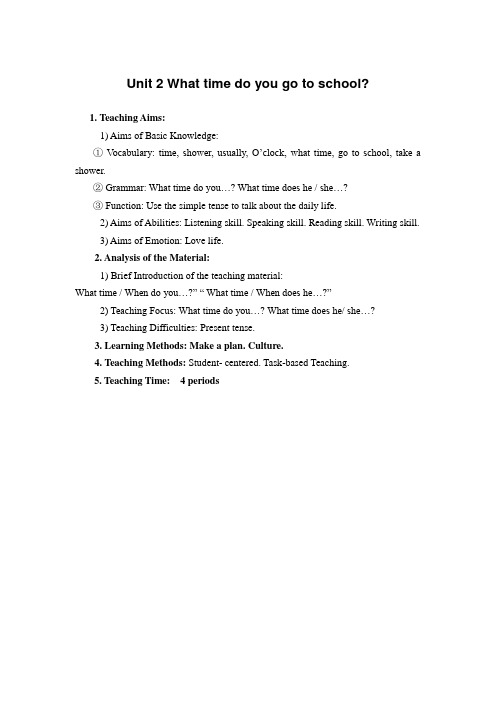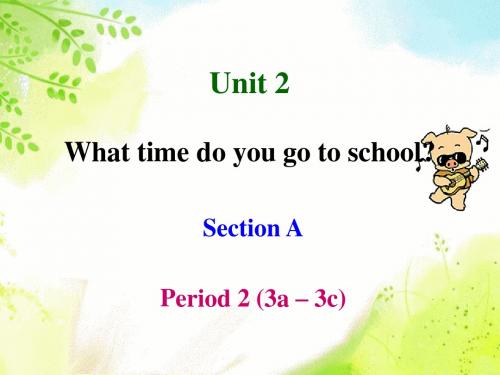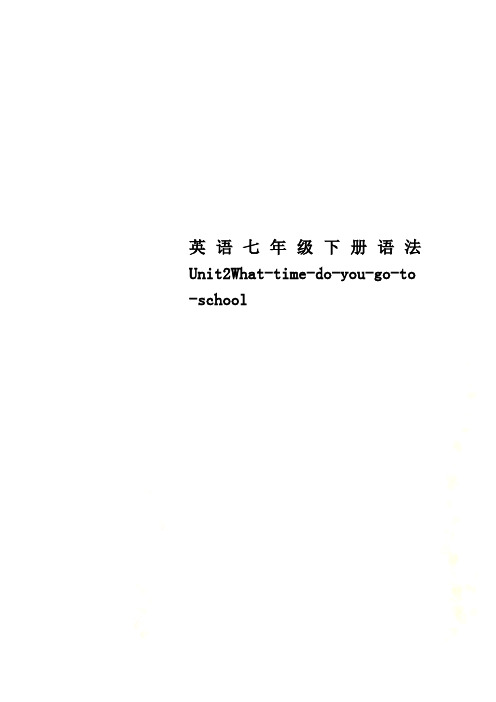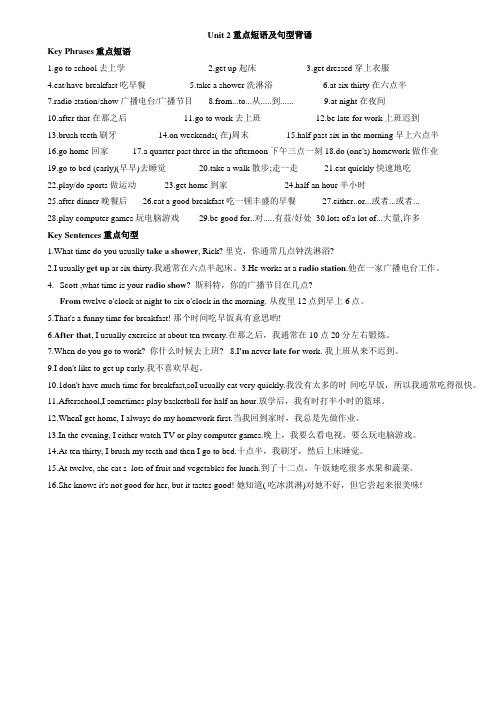2015年Unit 2 What time do you go to school课堂练习题及答案
【新学期备课参考】2015年春七年级英语下册:Unit 2 What time do you go to school教案

Unit 2 What time do you go to school?1. Teaching Aims:1) Aims of Basic Knowledge:①V ocabulary: time, shower, usually, O‟clock, what time, go to school, take a shower.②Grammar: What time do you…? What time does he / she…?③ Function: Use the simple tense to talk about the daily life.2) Aims of Abilities: Listening skill. Speaking skill. Reading skill. Writing skill.3) Aims of Emotion: Love life.2. Analysis of the Material:1) Brief Introduction of the teaching material:What time / When do you…?” “ What time / When does he…?”2) Teaching Focus: What time do you…? What time does he/ she…?3) Teaching Difficulties: Present tense.3. Learning Methods: Make a plan. Culture.4. Teaching Methods: Student- centered. Task-based Teaching.5. Teaching Time: 4 periodsPeriod 1(Section A: 1a-2a)授课人:______ 授课班级: _____ 授课时间:2014年___月___日____午第____节Step One: Warming-upGreetingT: Good afternoon, everyone.Ss: Good afternoon, Miss Yang.Step Two: Presentation1.Adjust the time, and ask students questions.T: What time is it? Ss: It‟s 12 o‟clock. ( Write on Bb )( Help Ss to say )T: What time is it? Ss: It‟s 10:15.( Help Ss to say )2.Ask one student to come to the front, adjust the time and ask the otherstudents.S1: What time is it? Ss: It‟s 9 o‟clock.3.Teach the new words & phrases.Show some pictures of different clocks and the activities.T: I‟m very busy these days. Can you guess what time I get up / eat breakfast / go to school / run / take a shower? ( Write on Bb)T: I usually get up at 6:35. ( Teach Ss the new word “ usually” )S1: You usually eat breakfast at …S2: You usually run at…S3: You usually take a shower at …4.Ask Ss to do the exercise of 1a, and then check the answers.Step Three: Listening1.Show Ss the timetable of Rick‟s ( write on small Bb )Ask Ss listen to the recorder and fill in the chart.Then check the answers.2.Ask and answer.T: What time does Rick get up / eat breakfast / run / go to school / take a shower ?Ss: He gets up / eats breakfast / runs / goes to school / takes a shower at…( Ask Ss pay attention to the underlined phrases.)Step Four: Consolidation1.Ask Ss to look at the pictures and tell their days.Example: I usually get up at …. I eat breakfast at …. I go to s chool at …. At …, I takea shower.Step Six: Homework1.Try to remember all the words & phrases.2.Survey: Ask your classmates their routines, and give your report.3.Plan: January 1st is coming. Please plan it, and make your day wonderful.Step Seven Blackboard DesignReflection after class:_____________________________________________________________________ _____________________________________________________________________ _____________________________________________________________________ _______________________Period 2 (Section A: 2b-Grammar Focus)授课人:______ 授课班级: _____ 授课时间:2014年___月___日____午第____节1. Aims and demands :1) Language skills :Ss learn to talk about kinds of transportation, and how long it takes to go places, and how far apart places are.2) Target Language : Words : how far , get to , bicycle , subway , bus stop, train station , minute, kilometer, mile , transportation , calendarSentences: How do you get to school ? / How long does it take ? / How far is it ? 3) Moral object : Through learning this unit , Ss can enable them to care for each other whenever crossing the roads and pay attention to the sign of traffic.2. Analysis of the material:Students have learned the transportation before.. In this unit ,they need to learn more details about the transportation. At the same time ,they need to learn “How long and How far” and they can use them freely.3. Teaching methods:pairwork , groupwork ,listening and speaking, practicing4, learning strategies:Personalizing Inferring vocabulary5.Teaching aids:Tape recorder, a projector or a computer6.Teaching period:Four periods.Period 3 (Section B: 3a-3c)授课人:______ 授课班级: _____ 授课时间:2014年___月___日____午第____节1. Aims and Demands: Key vocabulary, How do you get to school ? How does he getto school ?2. Teaching methods : Listening Writing Pairwork3. Teaching Aids : A tape recorder.Step I Leading inT: Good morning, everyone! You know I live far away ,so I go to school by bus every day. What about you? David, “How often do you go to school?”S:--------T: So we will talk about how to get to places in this unit.Step IINow I will show you pic tures and let‟s review the transportations we know. Then we will learn more about it .(take the subway) Please open your books and finish 1a. Step III1. There are five names in 1b.Now they are in the picture. We should find them.2. Play the tape .They should listen carefully and find the persons .Write the numbers next to the correct students in the picture above. After listening , check the answers together .Step IVPoint to the example in the box , ask two students to read it .then ask them to make up their conversations about how the people in the picture get to school .Teacher choose some pairs to act their conversations.Step VPracticing the listening :T: I will play two conversations The people are talking about how students get to school and how long it takes .The first time check the kinds of transportation that you hear. The second time match the time with the kinds of transportation activity 2a.Step VI1. Pay attention to the picture and dialogue.2. Make your own dialogue into pairs.3. Act it in front of the students.Step VIISummary and homework: This class we have learnt some key vocabulary and the target language .I hope after class you can survey how does your friends get to school .and pre-revise the 3a,3b.Step VIII Blackboard DesignReflection after class:_____________________________________________________________________ _____________________________________________________________________ _____________________________________________________________________ __________________________________Period 4授课人:______ 授课班级: _____ 授课时间:2014年___月___日____午第____节。
unit2 what time do you go to school- 七年级英语下册同步必背知

Unit 2 What time do you go to school?七年级英语下册必备知识清单一、词汇知识清单I、课标词汇[注意英译汉]up [ʌp] adv.向上get up起床;站起dress ['dres] v.穿衣服n.连衣裙get dressed穿上衣服brush [brʌʃ] v.刷;刷净n.刷子tooth [tuːθ] n. (pl. teeth[tiːθ])牙齿shower ['ʃaʊə] n.&v.淋浴; n.淋浴器(间)take a shower淋浴;洗澡usually ['juʒuəli] adv.通常地;一般地forty ['fɔː(r)tɪ] num.四十wow [waʊ] interj.(表示惊奇或敬佩)哇;呀never ['nevə] adv.从来;绝不early ['ɜːlɪ] adv.&adj.早(的)fifty ['fɪftɪ] num.五十job [dʒɒb] n.工作;职业work [wɜːk] n.&v.工作station ['steɪʃ(ə)n] n.电(视)台;车站radio station广播电台o'clock adv.(表示整点)……点钟night [naɪt] n.晚上;夜晚funny ['fʌnɪ] adj.奇怪的;滑稽好笑的exercise ['eksəsaɪz] v.&n.锻炼;练习on weekends(在)周末best [best] adj.最好的adv.最好地;最group [gruːp] n.组;群half [hɑːf] n.&pron.一半;半数past [pɑːst] prep.晚于;过(时间)adj.过去的quarter ['kwɔːtə] n.一刻钟;四分之一homework ['həʊmwɜːk] n.家庭作业do (one’s) homework做作业run [rʌn] v.跑;奔clean. [kliːn] v.打扫;弄干净;adj.干净的walk [wɔːk] n.&v.行走;步行take a walk散步;走一走quickly ['kwɪklɪ] adv.很快地either ['aɪðə] adv.或者;也(用在否定词组后)either…or…要么……要么……;或者……或者……lot [lɒt] pron.大量;许多lots of大量;许多sometimes [ˈsʌmtaɪmz] adv.有时taste [teɪst] v.有…的味道;品尝;n..味道;life [laɪf] n.(pl. lives [laɪvz])生活;生命II、语法词汇知其变[注意词性变化]1.dress['dres] v.穿衣服--- adj.dressed穿好衣服的;穿着……衣服的---n.dresser梳妆台;化妆师2.brush [brʌʃ] v.刷;刷净n.刷子---ing形式brushing---pl.brushes3.tooth [tuːθ] n.牙齿--- pl.teethually ['juʒuəli] adv.通常地;一般地ual通常的,平常的5.work [wɜːk] n.&v.工作---3pl.works---ing形式working6.funny ['fʌnɪ] adj.奇怪的;滑稽好笑的---n.fun乐趣,享受7.exercise ['eksəsaɪz] v.&n.锻炼;练习---3pl.exercises---ing形式exercising8.best [best] adj.最好的adv.最好地;最---(原级)adj.good好的,优良的---(原级)adv.well有益的;合理的9.half [hɑːf] n.&pron.一半;半数---pl.halves10.quarter ['kwɔːtə] n.一刻钟;四分之一---pl.quarters11.run [rʌn] v.跑;奔---ing形式running---n.runner跑步者12.clean. [kliːn] v.打扫;弄干净;adj.干净的---ing形式cleaning---n.cleaner清洁工;清洁剂13.walk [wɔːk] n.&v.行走;步行---ing形式walking---n.walker步行者14.quickly ['kwɪklɪ] adv.很快地---adj.quick迅速的,快的15.sometimes [ˈsʌmtaɪmz] adv.有时---adv.sometime某个时候16.life [laɪf] n.生活;生命---pl.livesIII、重点短语知搭配[注意固定短语的英汉互译]get up起床get dressed穿上衣服take a shower洗淋浴radio station广播台on weekends在周末what time什么时间go to school去上学do one’s homework做某人的家庭作业take a walk散步either…or…要么……要么……;或者……或者……lots of…= a lot of很多;大量brush (my) teeth刷(我的)牙get to到达go home回家eat breakfast吃早餐go to work去上班get home到家go to bed上床睡觉at night在晚上be late for迟到IV、核心单词知用法[注意固定短语、句型和词块]Section A1. What time do you usually get up? 你通常什么时候起床?(P. 7)When do you go to work? 你的朋友们什么时候锻炼?(P. 8)(1)what time意为“何时;什么时候”。
2015新目标七年级下Unit2 What time do you go to school SectionA2 课件

do homework
take a shower
go to bed
What time do you usually get up? I usually get up at…
点此播放教学视频
What time do you usually run? I usually run at …
take a shower
Paris
p.m. Los Angeles
New York
London
It’s 7 :15 seven-fifteen
Beijing a.m.
Tokyo
Paris
p.m. Los Angeles
New York
London
get up
run
eat breakfast
go to school
eat lunch
Pair work
am
am
pm
pm
—What time is it ? / What’s the time?
—It’s …
What time do they usually go to bed?
Xiao Ming 20:40 Lucy 22:10 Tom 20:30 Nancy 21:10
Can you line up from the earliest to the latest bedtime?
go to school
What time do they usually go to school? They usually go to school at …
3a Write answers or questions. Use always, usually or never.
英语七年级下册语法Unit2What-time-do-you-go-to-school

英语七年级下册语法Unit2What-time-do-you-go-to -schoolUnit 2 What time do you go to school ?一.What time 什么时候,几点钟。
常用于对具体的(确切的)时间提问,也可用when来替换,但反之不一定行。
1. What time/ When do you get up in the morning?I get up at six o’clock in the morning.2. What time is it ? / What’s the time ?It’s six-thirty. / It’s half past six.二.★关于时间的表达法:顺读法,逆读法。
1. 顺读法:按汉语的习惯,先说点后说分的方法。
结构:点+分。
5:10 five-ten 8:30 eight-thirty9:46 nine forty-six 1:05 one-five整点的读法:基数词+o’clock7:00 seven o’clock 12:00 twelve o’clock2. 逆读法:借助介词past或to, 先说分后说点的方法,其结构为:分+past/to +点past 过to 差①当分钟数小于或等于30分钟时,用介词past表示。
7:05 five past seven 6:30 thirty past six =half past six30 thirty=half an hour 11:25②当分钟数大于30时,用介词to表示:几点差几分。
其结构为:(60-分)+to +(点+1)11:50 ten to twelve 9:45 fifteen to ten =a quarter to ten7:55 3:35hour 小时minute 分second 秒quarter 一刻钟写出同义句:seven thirty = ____ ____ seven eight forty = ____ ______ nine三.★感叹句What a funny time to eat breakfast !What a lucky guy!定义:表示喜怒哀乐等强烈感情的句子叫感叹句。
2015春_新版新目标英语_七年级下_Unit_2_what_time_do_you_go_to_school_教案(全)

Unit 2 What time do you go to school?一.Topic Daily routines二.Important① What time questions② When questions③ Adverbs of frequency三 FunctionsTalk about routinesAsk about and say times四.教学过程Period 1 (A1a-2c)I. Teaching Objectives1. Knowledge Objectives:(1) Expressions: up, get up, dress, get dressed, brush, tooth/teeth, shower, take a shower, usually,forty, wow, never, early, fifty, o’clock, half.(past, to)(2) Structure: ---What time is it? ---It is six.---What time do you usually get up? ---I usually get up at six a.m.3) Grammar: what time questions2. Ability Objectives:(1) Learn how to express the time.(2) Get Ss to ask about and say times.(3) Let Ss use what time questions.(4) Let Ss have the first understanding of always, usually and never.3. Moral Objectives: Time waits for no man.II. Teaching Importance(focus)(1) Learn how to press the time.(2) Get Ss to ask about and say times.(3) Let Ss to use what time questions.III. Teaching Difficulties1. 三种表达时间的方法,学生对past,to来表达时间会有可能混淆。
人教版七年级英语下册《Unit 2 What time do you go to school》(含

《Unit 2 What time do you go to school》(含5课时)导学案【学习目标】1. 正确听、说、读、写section A 单词。
2. 运用“what time”和“where”引导的特殊疑问句询问并回答日常活动的时间。
【学习重点】熟练运用“what time”和“where”引导的特殊疑问句。
【学习难点】准确使用“what time”和“where”引导的特殊疑问句询问并回答。
【学习流程】一、自主学习(教师寄语:Knowledge is power.知识就是力量.)学习任务一:会读写、本课4个单词及7个短语.1、个人自读、记忆本课单词.2、小组互相检查单词读的情况.3、小组内竞赛,看谁记得快、准,并展示(默写)单词: 锻炼;练习___________ 淋浴,淋浴器___________通常___________ 刷;刷净___________短语:几点,什么时候_________________ 穿上衣服_________________ 洗淋浴_________________ 吃早饭_________________广播电台_________________ 刷牙_________________4、认真观察1a的图画,将词语与图片搭配,并核对答案。
二、交流展示学习任务二:运用句型What time ...?谈论Rick的日常生活.1、熟读1a中的对话,理解并复述.2、小组为单位,两人合作,谈论Rick的日常生活(分别扮演Rick和采访者).3、熟读2d中的对话,理解并复述.4、小组为单位,两人合作,角色扮演Scott和采访者.【合作共建】小组讨论该如何表达时间?写出下列时间.9:00 ________________ 11:00 ____________10:30 _______________ 12:50 ____________三、知识反馈(一)根据汉语完成句子1. 我早上六点起床.I ______ ______ _______ six in the morning.2.他的爸爸晚上九点洗澡.His father ______ ______ _______ ____ nine in the evening.3.你每天早上七点跑步吗?_____ you _______ ______ seven every morning?4.你姐姐几点吃晚饭?______ ______ _____ your sister eat _______?5.我上班从不迟到.I’m_______ _____ ______ work.6.他十二点吃午饭.He ______ _____ at twelve.(二)句型转换,按要求改写句子.1.Alice takes a shower at 9:00.(提问划线部分)__________________________________________?2.I have some tea in my cup.(改为否定句)__________________________________________.3.The old man is seventy.( 提问划线部分)__________________________________________.四、学后反思____________________________________________专注:心无旁骛,万事可破Unit 2 What time do you go to school?第2课时【学习目标】1.熟练掌握本课的单词和部分短语.2.熟练运用句型询问时间,以及在某个时间干什么事What's the time? It's…What time do you usually…? I usually…at…3.能根据要求写出简单的句子表述自己和他人的日常活动.【学习重点】能根据要求写出简单的句子表述自己和他人的日常活动.【学习难点】一般现在时中不同人称对应的动词的变化形式.【学习流程】一、自主学习(教师寄语:Knowledge is power.知识就是力量.)学习任务一: 读写、记忆本课单词和短语.1.个人自读,记忆.2.小组互相检查读、写情况.3.根据汉语写出下列英语单词和短语并展示.单词:最好的_________ 小时_________ 组;群________ 牙齿__________ 短语:在周末_______________ 去上班_______________二、交流展示学习任务二: 通过练习描述一天的时间1. Grammar Focus2. Writing(3a,3b)3. Survey (3c)学习任务三:试着模仿说出自己的一天的活动三、知识反馈专注:心无旁骛,万事可破(一)单项选择1. The bus usually ________ him to work.A. takeB. takesC. /D. bring2. I usually go to school _________ seven o'clock..A. atB. inC. onD. for3. — What's the time? —__________ nine-fifteen.A. The time isB. It'sC. AtD. This is4.We go to ________at six thirty in the morningA. the schoolB. a schoolC. schoolD. schools(二)用括号内所给词的适当形式填空1.Alice brushes her __________(tooth) every morning.2.I t’s __________(fun) to play volleyball on the beach(沙滩).3.I usually get __________ (dress) at six in the morning.4.Tom is my __________ (good) friend in my class.5.My father __________ (work) in a school.四、学后反思____________________________________________专注:心无旁骛,万事可破Unit 2 What time do you go to school?第3课时【学习目标】1.正确听、说、读、写section B单词.2.能够利用所学句型询问及表述时间.3. 学会谈论自己或别人的日常生活,询问及表述时间.【学习重点】学会谈论自己或别人的日常生活,询问及表述时间。
Unit 2 What time do you go to school_ 单词、短语及重点句型

Unit 2 重点短语及句型背诵Key Phrases重点短语1.go to school 去上学2.get up 起床3.get dressed 穿上衣服4.eat/have breakfast 吃早餐5.take a shower 洗淋浴6.at six thirty 在六点半7.radio station/show 广播电台/广播节目 8.from...to...从.....到...... 9.at night 在夜间10.after that 在那之后 11.go to work 去上班 12.be late for work 上班迟到13.brush teeth 刷牙 14.on weekends( 在)周末 15.half past six in the morning 早上六点半16.go home 回家 17.a quarter past three in the afternoon 下午三点一刻18.do (one's) homework 做作业19.go to bed (early)(早早)去睡觉 20.take a walk 散步;走一走 21.eat quickly 快速地吃22.play/do sports 做运动 23.get home 到家 24.half an hour 半小时25.after dinner 晚餐后 26.eat a good breakfast 吃一顿丰盛的早餐 27.either..or...或者...或者...28.play computer games 玩电脑游戏 29.be good for..对.....有益/好处 30.lots of/a lot of...大量,许多Key Sentences 重点句型1.What time do you usually take a shower, Rick? 里克,你通常几点钟洗淋浴?2.I usually get up at six thirty.我通常在六点半起床。
2015年春新目标英语七年级下Unit 2 What time do you go to school SectionB 1a-1e公开课课件

SectionB 1a—1e
take a shower
get up
run
go to school
eat breakfast
do homework
go to bed
检 查 预 习
take a walk clean my room
1.Write something about you day. 2.Preview the next lesson.
1. 点钟数 + 分钟数 six fifteen eg: 6: 15 seven twenty-nine 7: 29 2. 分钟数 + past +点钟数 (分钟数不超过30分) a quarter past six eg: 6: 15 twenty-nine past seven 7: 29 half past eight 8: 30 3. 差分钟数 + to +下一点钟数 (分钟数超过30分) a quarter to six eg: 5: 45 9: 39 twenty-one to ten
Exercises :(完成句子)
1.我早上5点起床。 I ___ ___ at 5 in the ___. 2.Mary 晚上7点做作业。 Mary ___ ____ at 7 in the___. 3.你什么时候回家? When do you ___ __ ? 我下午6点回家。 I ___ ___ at 6 in the ___. 4.Tony什么时候睡觉 。 When ___ Tony ___ ___ ___? 他晚上9点睡觉。 He ___ ___ ___ at 9 in the evening.
- 1、下载文档前请自行甄别文档内容的完整性,平台不提供额外的编辑、内容补充、找答案等附加服务。
- 2、"仅部分预览"的文档,不可在线预览部分如存在完整性等问题,可反馈申请退款(可完整预览的文档不适用该条件!)。
- 3、如文档侵犯您的权益,请联系客服反馈,我们会尽快为您处理(人工客服工作时间:9:00-18:30)。
七年级(下) 英语 RJ 版5 U N I T 2What time do you go to school ?Section A (1a-2d)(10min.)一㊁根据句意及首字母或汉语提示完成单词1.She usually(通常)gets up at 6:30in the morning.2.I often take a shower(淋浴)before I go to bed.3.Forty(四十)students joined the English club in our school.4.He exercises every morning in the park.5.His uncle works at a radio station.二㊁用所给内容的适当形式填空1.My grandmother has only four teeth(tooth).2.He usually works(work)at night.3.Tom wants to have two brushes(brush).4.What time do you usually get(get)up?5.He doesn’t take(not take)a shower at 6:30.三㊁(2012·浙江温州中考)用方框中所给词的适当形式填空,每词限用一次spend between safe Friday black 1.Tony is a funny singer with black eyes and curly hair.2.Mike often spends his weekends going hiking with his classmates.3.Turn left and you will see the library between the supermarket and the bank.4.Many people prefer to travel by plane.They think a plane is faster and safer than a train.5.Lucy can’t go on a picnic this Friday afternoon because she has a speech contest.四㊁根据汉语意思完成句子1.我妹妹通常早上六点起床㊂My sister usually gets up at six in the morning.2.你哥哥几点吃早饭?What time does your brother have breakfast?3.他的弟弟不会自己穿衣服㊂His brother can’t get dressed by himself.4.我的父亲从早上六点工作到下午五点五十分㊂My father works from six in the morning to five fifty in the afternoon.5.我们的老师上班从未迟到过㊂Our teacher is never late for /never arrives late for work.第一题5分,第二题5分,第三题5分,第四题10分,总计25分□未达标 □达标(15分) □优秀(20分)七年级(下) 英语 RJ 版6 Section A (Grammar Focus-3c)(10min.)一㊁单项选择1. C do you usually take a shower? At 7:00.A.What B.Where C.What time D.How 解析:具体的时刻通常用what time 提问㊂2. B weekends we have breakfast 8o’clock.A.In;at B.On;at C.On;in D.In;on 解析:在周末用介词on,在几点钟用介词at㊂3.Lucy usually brushes her teeth at D o’clock.A.seven thirty B.seven fifteen C.seven forty D.seven 解析:在表示整点的时候,用o’clock 表示㊂4.Mike often C a shower in the morning.A.makes B.have C.takes D.get 解析:主语是第三人称单数,故谓语动词用第三人称单数形式;take/have a shower 意为 淋浴”㊂5.We have D supper night.A.the;in B./;in the C.the;in the D./;at 解析:表示吃三餐时,三餐前不加冠词; 在晚上”用at night 表示㊂二㊁句型转换1.Mary’s father goes to work at seven.(改为一般疑问句)Does Mary’s father go to work at seven?2.Tom gets up at 6:00in the morning.(改为否定句)Tom doesn’t get up at 6:00in the morning.3.He usually has lunch at twelve o’clock.(对画线部分提问)What time does he usually have lunch?4.our,in,group,gets,late,up,Li Hui,usually(连词成句)In our group,Li Hui usually gets up late.5.We often go to a movie on weekends.(对画线部分提问)When do you often go to a movie?三㊁根据对话内容,填写适当的单词A:What 1 do you usually get up on weekends?B:I usually get up 2 8:30on weekends.A:It’s so early.I get up at 10:00. 3 do you usually 4 for breakfast?B:I usually have eggs,bread and milk.What 5 you?A:I never eat breakfast.B:Oh.I think it’s not good for your health.1.time 2.at 3.What 4.have 5.about第一题10分,第二题10分,第三题5分,总计25分□未达标 □达标(15分) □优秀(20分)七年级(下) 英语 RJ 版7 Section B (1a-2c )(10min.)一㊁根据句意及首字母或汉语提示完成单词1.My mother gets up at half past five.2.A quarter is fifteen minutes.3.My partner usually does her homework(家庭作业)at seven in the evening.4.They walk to school in the morning.5.We often clean(打扫)our classroom at 6:40.二㊁英汉互译1.散步take a walk 2.做作业do one’s homework 3.回家go home 4.half past six 六点半5.a quarter past three 三点十五分 6.a quarter to eight 七点四十五分7.go to bed 上床睡觉8.four thirty 四点半三㊁单项选择1.It’s ten o’clock.I must go B .A.to home B.home C.my home D.his home 解析:home 是表示地点的副词,前面不能加介词㊂go home 意为 回家”㊂2.I C at ten o’clock in the evening.A.have breakfast B.get up C.go to bed D.watch morning TV 解析:句意为 我晚上十点睡觉”,根据常识可知其他动作一般不可能在晚上发生㊂3.What time does Lucy A after school?A.do her homework B.does her homework C.do her homeworks D.does her homeworks 解析:homework 为不可数名词,do one’s homework 意为 做某人的作业”;前面有助动词does,后面动词应用原形㊂4.They usually have dinner at A in the evening.A.a quarter to seven B.a quarter seven C.seven a half D.a half seven 解析:时间的表达法:直读式,即直接读出时间;数字过差式,即几点过几分,几点差几分㊂十五分常用a quarter 表示,半小时常用half 表示㊂5.She usually D at five in afternoon.A.take a walk;/ B.take a walk;the C.takes a walk;/ D.takes a walk;the 解析:主语she 为第三人称单数,故谓语动词用第三人称单数形式;在早上㊁下午㊁晚上要加定冠词the㊂第一题5分,第二题8分,第三题10分,总计23分□未达标 □达标(14分) □优秀(18分)七年级(下) 英语 RJ 版8 Section B (3a )-Self Check(10min.)一㊁根据句意及首字母或汉语提示完成单词1.He lives a healthy life.2.It’s seven fifty.Our teacher is coming.Let’s go to the classroom quickly.3.Junk food usually tastes good,so students like eating it after class.4.You need to clean(打扫)your room.It’s dirty(脏的).5.I eat lots(许多)of vegetables and do exercise every day.二㊁单项选择1.Sam always takes a shower and eats A in the morning.A.a good breakfast B.a breakfast C.the breakfast D.breakfasts 解析:三餐前一般不加冠词,但是当三餐前有形容词修饰时,要加冠词㊂2.I like eating meat because it tastes B .A.bad B.good C.well D.funny 解析:taste 是系动词,其后接形容词㊂3.His mother doesn’t have much time for breakfast,so she usually eats very A .A.quickly B.quick C.slow D.slowly 解析:由前半句句意 他妈妈没有太多的时间吃早饭”可知, 因此她通常吃得很快”;修饰动词用副词㊂4.My mother is very busy.She can’t B dinner for me.A.eat B.cook C.cooks D.have 解析:根据前句句意 我妈妈很忙”可知 她不能为我做饭”㊂情态动词后加动词原形㊂5.At six in the afternoon,she eats A fruit and vegetables for dinner.After dinner,she sometimes computer games.A.lots of;plays B.many;plays C.a lot;do D.lots of;do 解析:fruit 在此指水果,是不可数名词,不能用many 修饰;lots of 既可以修饰可数名词复数,也可以修饰不可数名词㊂ 玩电脑游戏”用play computer games 表示㊂三㊁根据汉语意思完成句子1.在周末,我要么做作业,要么打扫我的房间㊂On weekends,I either do my homework or clean my room.2.我女儿喜欢牛奶和鸡蛋,因为她知道它们对她有好处㊂My daughter likes milk and eggs because she knows they are good for her.3.我的体育老师经常在早上五点做运动㊂My PE teacher often plays sports at five in the morning.4.她通常在下午5:30到家㊂She usually gets home at half past five in the afternoon.5.我们的英语老师起得很早,早晨第一节课从未迟到过㊂Our English teacher gets up very early and she is never late for /never arrives late for the first class in the morning.第一题5分,第二题10分,第三题10分,总计25分□未达标 □达标(15分) □优秀(20分)。
